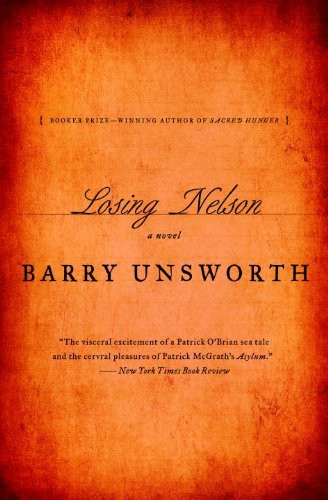
Losing Nelson
کتاب های مرتبط
- اطلاعات
- نقد و بررسی
- دیدگاه کاربران
نقد و بررسی

October 4, 1999
Unsworth (Sacred Hunger; Morality Play) delivers another memorable tour de force in this tense portrait of a London man obsessed with Britain's greatest naval hero, Lord Nelson. Charles Cleasby lives by the "Horatio calendar," reenacting Nelson's battles with model shops on a glass table in his basement. In his mind they are joined: Nelson is a radiant angel, a hero of unstained virtue, and he is Nelson's other, shadow side: "I was his heir, I had inherited his being." For years Cleasby has been writing a book extolling Nelson's heroism, but has become blocked over a controversial incident in June 1799, when Nelson apparently tricked two fortresses of Neapolitan rebels into surrendering, under promise of a safe conduct, then turned them over to their murderous Bourbon king and queen for hanging. Unsworth's control of his material, and his artistic ingenuity, his narrative skill in what is essentially a highly literate suspense novel, are supreme here. By compressing the milestones of one man's lifetime into the calendar of another man's year, he creates a shuffled chronology of historical events that parallels his narrator's wavering state of mind. Paragraph by paragraph, Cleasby's sense of self shifts and dissolves; in one paragraph he describes the view of Nelson's ship entering Naples harbor, in the next "we" are standing at its prow, and in the next it's "I" onto whose arm Lady Hamilton is swooning. Cleasby's erotic stirrings for Emma Hamilton and his misadventures with London's Nelson Club are the stuff of high comedy, and it's hard to say exactly why this novel seems so unsettling and suspenseful. Unsworth holds open a door to normalcy in Cleasby's growing attraction to Miss Lily--hired to transcribe his manuscript to a word processor--whose down-to-earth and very contemporary responses put Nelson on a more human scale. The book's surprise ending, held back to the final page, seems therefore all the more cruelly ironic--and probably the nastiest twist of any in recent fiction. BOMC selection.

June 1, 1999
From Booker Prize winner Unsworth: biographer Charles Cleasby is obsessed with his subject, Lord Horatio Nelson, until he uncovers an act of brutality that finally forces him to relinquish his hero worship.
Copyright 1999 Library Journal, LLC Used with permission.

September 15, 1999
With "Nelson," Unsworth offers a new interpretation of "historical fiction" and clever "commentary on the role of the hero in the national and personal psyche and the distorted world of those who live their lives through others. Charles Cleasby, a reclusive amateur historian, is obsessed with Lord Admiral Horatio Nelson, hero of the Battle of Trafalgar. Cleasby is fascinated with every detail of his hero's life: myriad historical anniversaries, details of his personal life, and accounts of famous battles that Cleasby reenacts with ship models in his basement. In short, Cleasby is living vicariously through Nelson's life, his hero's exploits compensating for his mundane existence. To assert his divine image of Nelson, Cleasby is determined to disprove Nelson's involvement in a brutal massacre that makes him appear to Cleasby and others less George Washington and more Lieutenant Calley. The hero/antihero image of Nelson haunts Cleasby. The gentle nagging of his secretary and colleagues at the Nelson society fails to temper Cleasby's image of Nelson as Unsworth builds his story to a satisfying final climax. ((Reviewed September 15, 1999))(Reprinted with permission of Booklist, copyright 1999, American Library Association.)

























دیدگاه کاربران